KadAfrica Proves: Listening to Clients = Impact
Categorized as: Africa, Education, Girls & women, Grantee, Job Creation, Leadership, Our Partners, Poverty Alleviation, Stories on June 5, 2021. Related Grantee: KadAfrica.
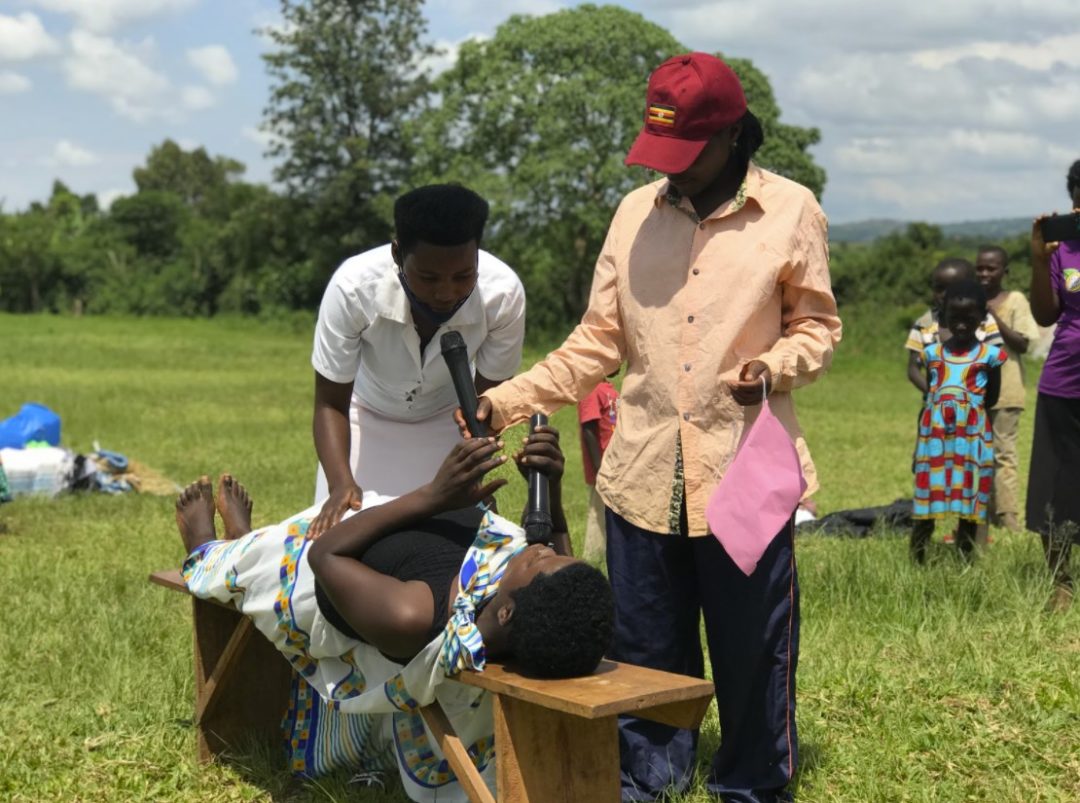
At Sweswe Site, Kyaka II Refugee Settlement, Cervical Cancer Advocacy Event, girls and women act out a cervical cancer screening procedure.
Editor’s Note: In Part II of our series on our Catalyst Partner, KadAfrica, we focus on the new programs created within the KadAfrica community. These programs place the voices of those they serve at the forefront of their design. They listen and adapt the programs according to the specific needs of the communities they serve. This community-based concentration is one we support wholeheartedly.
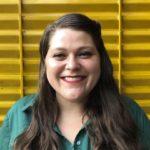 By Courtney Price, KadAfrica Director of Programs
By Courtney Price, KadAfrica Director of Programs
COVID-19: KadAfrica Pushed Through
In 2020 KadAfrica trained 460 women and girl farmers in 2 refugee settlements and 1 Ugandan rural district. In the midst of an unprecedented global pandemic, we pivoted our training to distribute masks, soaps, and to provide critical, accessible health education in rural communities in local languages. While many local offices of large international organizations left the country and closed operations when COVID-19 hit, we were one of the few organizations who stayed. We were one of the few organizations who were given permission from local authorities and the Office of the Prime Minister to continue delivering programs. This meant more training sessions, higher costs, and the extraordinary passion and the determination of KadAfrica staff. This was possible because of the level of engagement and trust we foster in the communities we operate in, because our staff come from these communities, because we involve all community stakeholders in our work, and because we listen to the needs and concerns of the women, girls, and communities we work with and meet them where they’re at.
KadAfrica Male Champions
One of the key learnings and successful pivots we’ve implemented in recent months is creating a small male engagement program in sexual and reproductive health and gender based violence issues program. In all of the feedback sessions after our SRHR (Sexual Health and Reproductive Rights) advocacy trainings, girls and women told our coaches, yes this information is great, now we know about safe and consensual sex, we know about HIV, about safe family planning options, about choosing how many children we might want, about our rights —but none of that matters if our partners, our fathers, our communities don’t understand them and prevent us from exercising these rights.
In designing the program, we asked KadAfrica girls and women and KadAfrica male and female staff what are the common perceptions and obstacles, what do men and boys believe about women and girls, what are the situations you face, who reinforces and influences these ideas and what should we prioritize?
From these learnings we built a 3 session male engagement mini-program. We piloted it in 2 sites in January and February 2021 — 1 refugee site in Kyaka II Refugee Settlement and 1 rural site in Kabarole District. With 80 men: the husbands, fathers, brothers, and key male community influencers and with KadAfrica male staff from these communities as coaches we delivered a program on positive masculinity, on healthy relationships, on gender based violence, on the economic, sexual and reproductive rights of girls and women. During the session on family planning, men, women, and girls of our sites attended, learned, and asked questions together.
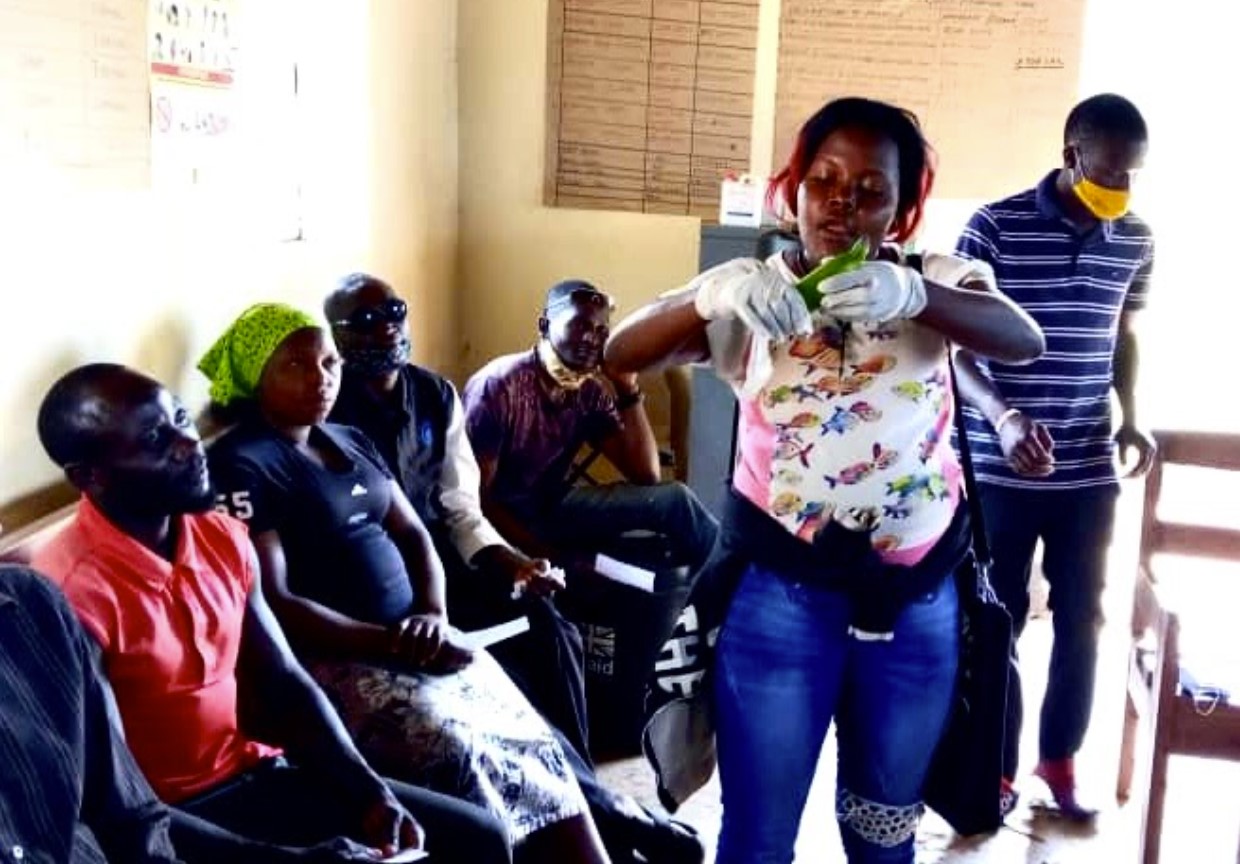 KadAfrica Cluster Coordinator, and KadAfrica Program Experience program graduate herself, Immaculate Kabuhama, demonstrating correct use of a condom during the couple’s family planning session in the male engagement program pilot.
KadAfrica Cluster Coordinator, and KadAfrica Program Experience program graduate herself, Immaculate Kabuhama, demonstrating correct use of a condom during the couple’s family planning session in the male engagement program pilot.
The results of this rapid 3 session program were astonishing, even to us.
“A girl or woman should be allowed to decide independently how to use the money she earns.”
- Before the program 46% of the men surveyed disagreed with the statement, with 33% strongly disagreeing.
- At the end of the program 64% of the men strongly agreed that women and girls should decide independently what to do with their own money, and 91.78% agreed overall with the statement.
“A girl or woman should be allowed to decide independently if she wants to use family planning methods and which methods she prefers to use.”
- Before the program 41% of men strongly disagreed with that statement.
- By the end of the program 50% of men strongly agreed and 70% overall agreed that women and girls should get to choose if and when they want to use family planning.
At the end of the program 93.55% of men agreed that a woman can refuse sex with her husband or sexual partner.
At the end of the program, 95% of the men agreed that everyone in their community (men, women, boys, girls, themselves) benefited from learning about gender.
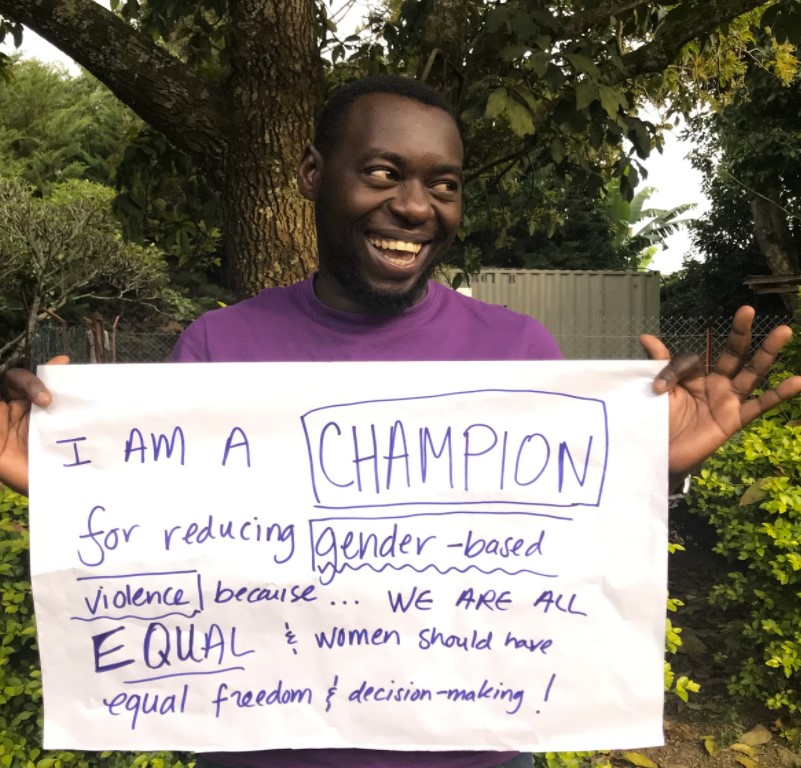 Alex Aliyo, KadAfrica Agronomy Team Lead, Male Champion Program Trainer, and proud feminist holding up his reasons for championing the rights of women and girls.
Alex Aliyo, KadAfrica Agronomy Team Lead, Male Champion Program Trainer, and proud feminist holding up his reasons for championing the rights of women and girls.
What made this rapid, intensive pilot program about a lot of complex issues successful? Most importantly, we designed the program for men. We did not shame them, and we created safe spaces for them to talk about difficult issues. We asked them how the pressures of society hurt them, made them feel inadequate, made them feel they couldn’t be open about their problems, that they couldn’t cry. We asked them if they could envision a positive male role model with their partner where they could shoulder burdens together, and support each other. We asked how they could show up in their own communities when issues of gender based violence came up, if they would bear witness, if they would report them. And for 95+% of the men in our program – they were ready.
Mental Health – Stress and Trauma Management, Safe Spaces, and Sexual Assault Support
Another key learning for us in this last year of working in refugee settlements was how much stress and trauma play such a major role in the daily lives of refugees. We had to address mental health in our programming if we were going to be effective. Uganda hosts 1.4 million refugees who have fled war, violence, rape as a tool of war, lost everything they owned, and have come here to start over.
In our sessions on gender based violence and SRHR in Kyaka II Refugee Settlement, several girls and women spoke about being survivors of rape for the first time in their lives, described the fear and manipulation they faced, and that they thought they were completely alone in this experience until their KadAfrica group.
Some of these girls and women went on to become passionate advocates about gender based violence in Kyaka II Refugee Settlement after these sessions and KadAfrica SRHR advocacy training . With business, public speaking, self-esteem and confidence training many of these girls and women also launched businesses towards a more independent life for themselves and their children.
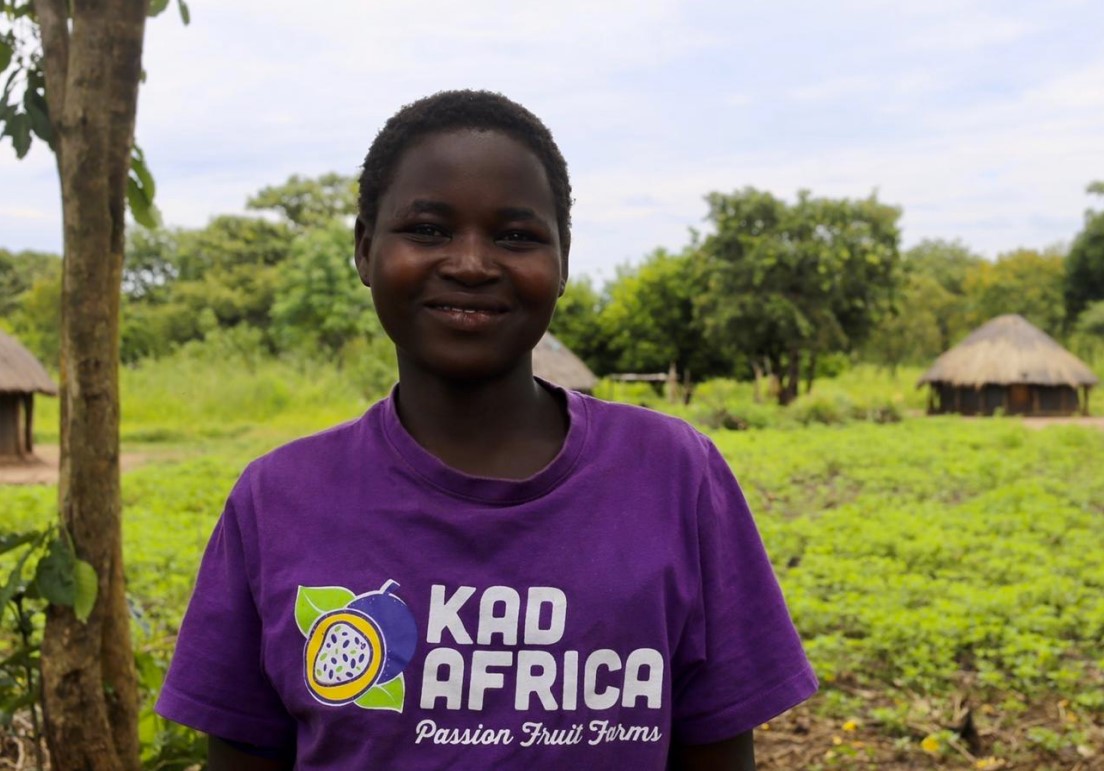 Betty Akello, age 16, Passionate Advocate on Child Marriage, Education and Girl Potential in Palabek Refugee Settlement.
Betty Akello, age 16, Passionate Advocate on Child Marriage, Education and Girl Potential in Palabek Refugee Settlement.
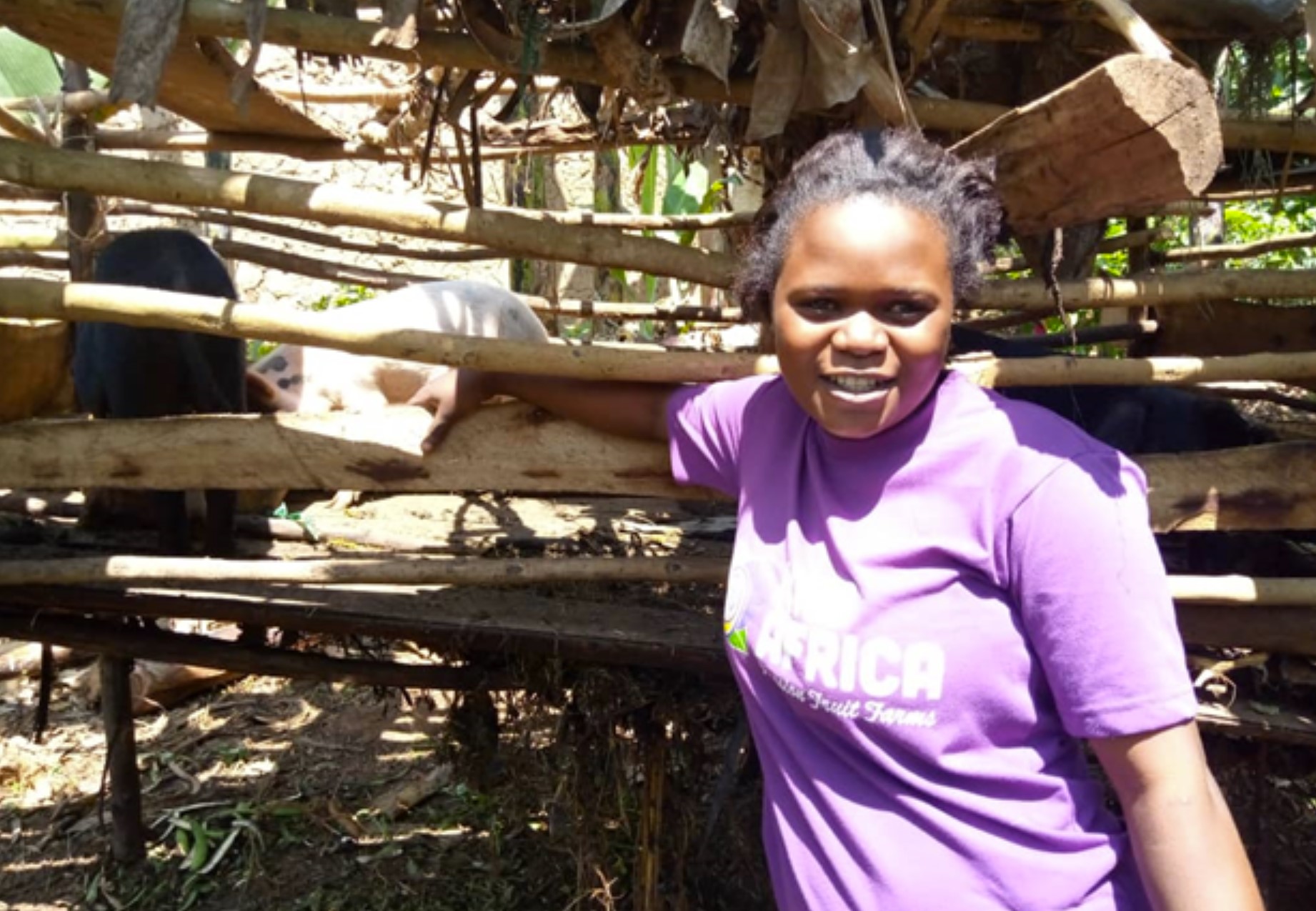 Rose Akankwatsa, Sweswe site, Kyaka II Refugee Settlement, Rose used her earnings from growing passion fruit and savings from her KadAfrica savings group to launch a piggery business.
Rose Akankwatsa, Sweswe site, Kyaka II Refugee Settlement, Rose used her earnings from growing passion fruit and savings from her KadAfrica savings group to launch a piggery business.
We also learned that the stress on men as providers within the family coupled with the loss of assets, and the lack of jobs actually leads to increased incidences of gender based violence as well as the expectation that girls get married even earlier to reduce pressure on their families compared to life before the refugee settlement and compared to similar Ugandan national communities.
In response to these learnings and in collaboration with Miller Center Global Social Benefit Institute Fellows, we conducted research with refugee beneficiaries on stress and trauma in their daily lives and developed an entirely new Mental Health Stress and Trauma Management curriculum module and are now looking for funding to test and scale it.
Cervical Cancer: A Real Threat and KadAfrica’s Creative Fight Against It
Another key learning in the last two years is the significant lack of access to information on cervical cancer both women and girls and men and boys in Uganda have. Uganda has very low rates of women going for cervical cancer screenings, high incidences of HPV, and cervical cancer is the number one cancer related death for women.
In the KadAfrica Experience advocacy training on SRHR, cervical cancer was the most popular topic chosen in 2020, and amongst the years of advocacy events program staff have trained and attended – it was by far the most effective and engaging.
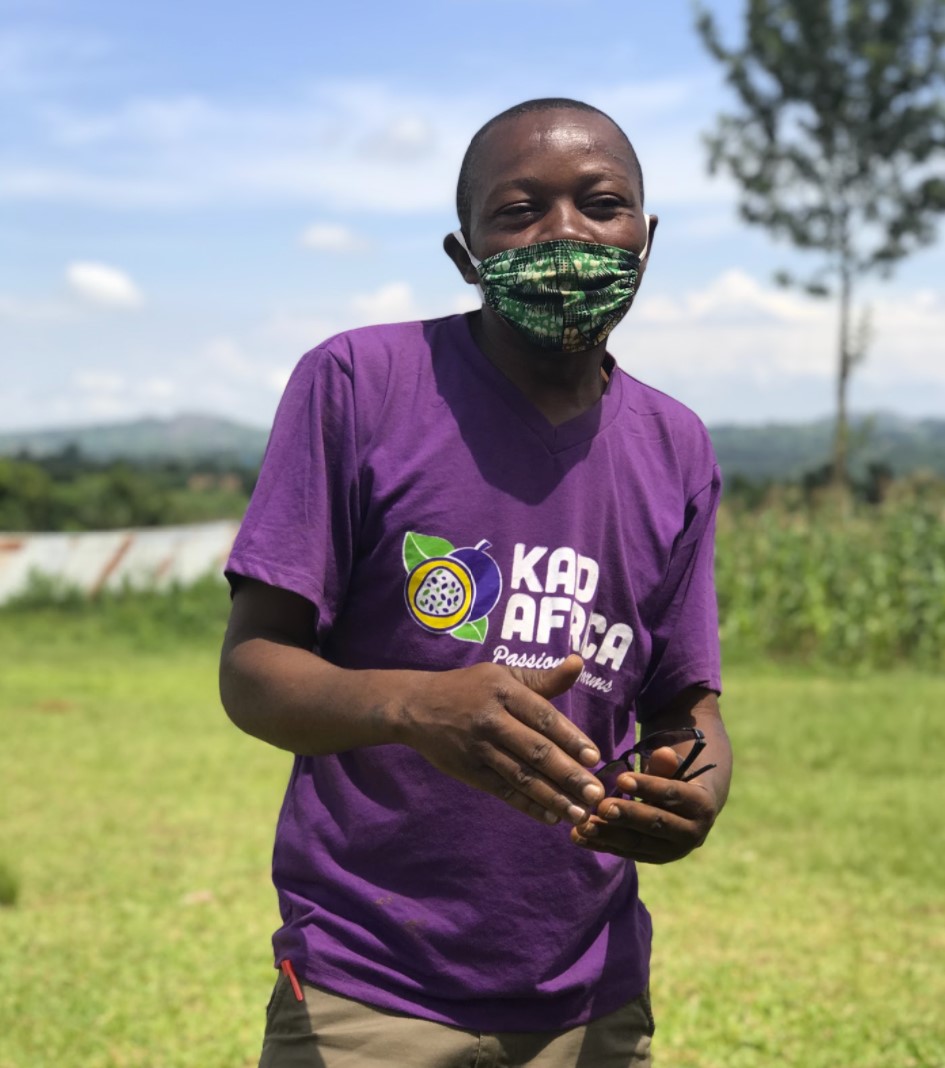 At Sweswe Site, Kyaka II Refugee Settlement, Cervical Cancer Advocacy Event, Bob Kasaija, Sweswe Agronomy Site Manager speaks to the crowd about the role men play and their responsibilities in human papillomavirus and cervical cancer.
At Sweswe Site, Kyaka II Refugee Settlement, Cervical Cancer Advocacy Event, Bob Kasaija, Sweswe Agronomy Site Manager speaks to the crowd about the role men play and their responsibilities in human papillomavirus and cervical cancer.
The success of health education and knowledge change in this topic is entirely attributable to the passion and confidence of KadAfrica Experience girls and women in sharing factual information, in delivering hilarious and relatable plays, including realistic scenes portrayed by themselves of families taking their daughters for HPV vaccinations, of health workers performing screening procedures, of women receiving news of their advanced diagnosis. Lastly, because both the girls and women and KadAfrica male and female staff created a safe and relatable space for community members – men and women, girls and boys, young and old to ask questions.
Our ultimate learning in this last year is not only providing the economic, health, and social training to KadAfrica women and girls. It is also catalyzing the external community environment towards those goals by further engaging men, boys, and other community stakeholders. By continuing to place the voices of the people we seek to impact at the forefront of our design; adaptive delivery of programs; prioritizing hiring and promoting staff that come from the same communities that we serve, we are more effective.
All photos were provided from KadAfrica.
LEARN more about KadAfrica here.
SHARE this story with your networks; see menu at top and bottom of page.
DONATE directly to help support KadAfrica here.
SUBSCRIBE! Like what you see? Click here to subscribe to Seeds of Hope!
